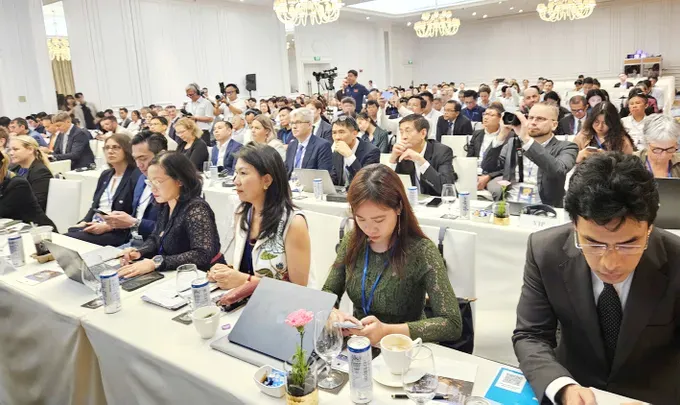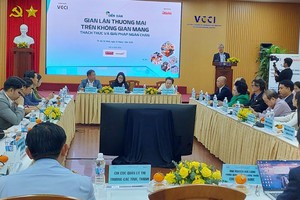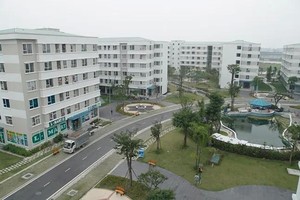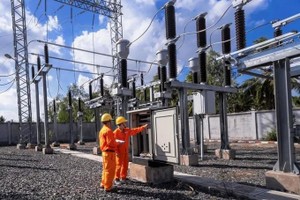At the forum “Connecting the European Tech Business Offer with Vietnam’s Digital Future”, which was organized by the Ministry of Science and Technology in collaboration with the European Union (EU) Delegation on October 21, European businesses confirmed a trend of increasing investment in high technology, green energy and digital infrastructure in Vietnam.

Expanding investment in core technologies
At the forum, EU Ambassador to Vietnam Julien Guerrier stated that over 2,400 projects by European companies are currently operating in Vietnam, with a total registered capital of nearly US$29.5 billion. This demonstrates Vietnam’s emergence as a strategic destination for the EU’s long-term investment plans in Southeast Asia. The EU is actively promoting its Global Gateway Initiative to boost investments in green infrastructure, clean energy and digital transformation.
The EU is rolling out a public-private investment package in Vietnam, featuring an AI Factory, secure connectivity and citizen-focused digital infrastructure. Vietnam is emerging as a regional tech hub while the EU seeks to be a trusted partner in technology, innovation and green energy, said Julien Guerrier.
A survey conducted by Decision Lab among over 1,200 EuroCham member companies indicates that 63 percent of businesses are satisfied with the investment environment in Vietnam, while 52 percent plan to expand their investments within the next 12 months. This confidence is concentrated in core technology sectors such as AI, semiconductors, data centers, renewable energy and green logistics, which are key strategic areas driving future growth.
European investors are accelerating their presence in Vietnam through a series of large-scale projects. LEGO (Denmark) is investing US$1 billion to build a factory in VSIP III Industrial Park, located in Binh Co Ward, Ho Chi Minh City, powered entirely by renewable energy. Pandora (Denmark) is committing US$150 million to jewelry manufacturing, creating over 7,000 jobs. Schneider Electric (France) is expanding its technical center in Ho Chi Minh City, while Copenhagen Infrastructure Partners (Denmark) is developing the La Gan offshore wind project with a capacity exceeding 3 GW.
Europe brings expertise in training and technology, while Vietnam offers market potential, skilled workforce and growth ambitions. Once both sides connect effectively, technology can truly serve people and the economy,” said Mr. Nguyen Duc Khuong, Chairman of AVSE Global.
In the semiconductor sector, experts are proposing collaboration in research, production and high-tech engineer training, enabling Vietnam to participate more deeply in the global value chain.
With 5G–6G networks and digital connectivity infrastructure, European corporations emphasize the need to build secure, stable and high-performance transmission and submarine cable systems, which are the foundations of e-commerce, digital finance and e-government
Additionally, numerous companies are seeking opportunities to develop digital technology infrastructure and open data platforms to enhance transparency and safeguard national data sovereignty.
Leading aerospace companies, including Thales, Airbus and Kineis, are advancing AI and space data technology transfers to support the development of smart cities, precision agriculture and climate change solutions. Simultaneously, energy innovators such as ECOSOI, Bioplant and Truecoop are targeting investment in integrated green-digital value chains, driving circular production, lowering emissions and fostering sustainable growth.
Ho Chi Minh City accelerates dual transformation
Attending and delivering remarks at the forum, Vice Chairman of the Ho Chi Minh City People’s Committee Nguyen Loc Ha emphasized that this is an opportune moment for European businesses and the city to join forces in developing high-tech and innovative solutions. The city is transforming into a technology and innovation megacity based on three pillars, including digital governance and sovereignty, core technology infrastructure, and a workforce aligned with green transformation
At the same time, Ho Chi Minh City is prioritizing three key areas of cooperation, comprising promoting high-quality investment and digital finance through the European Investment Bank (EIB) and other EU financial institutions under the Global Gateway Initiative, focusing on digital infrastructure, semiconductors and green energy; strengthening technology transfer and R&D in AI, semiconductors and emerging technology standards; and establishing innovation governance and technology sandbox environments modeled after European frameworks.
According to the General Statistics Office of Vietnam, by the end of third quarter 2025, total registered foreign direct investment (FDI) reached over US$28.5 billion, up more than 15 percent year-on-year, bringing Vietnam’s cumulative FDI to approximately US$530.7 billion.
Ho Chi Minh City is committed to maintaining its role as a proactive and enabling government, providing the most favorable conditions to realize collaborative initiatives. The city aspires not only to attract investment but also to co-create and grow together with European partners. HCMC is ready to become a trusted destination where ‘European technological strengths’ connect with ‘Vietnam’s digital future,’” emphasized Mr. Nguyen Loc Ha.
Deputy Minister of Science and Technology Bui The Duy noted that Ho Chi Minh City’s development strategy is fully aligned with the national technology agenda, as Vietnam prioritizes investment in AI, big data, blockchain, 5G–6G networks, cloud computing and cybersecurity.
Vietnam seeks deeper participation from European companies in data center projects, data protection platforms, digital legal services and digital identity solutions, as well as technology transfer in cybersecurity and e-government infrastructure, which are key foundations for building a transparent and sustainable data market in line with EU standards.
























